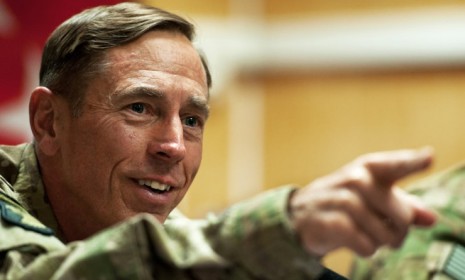Did the media fall for David Petraeus' hype?
As the media digests the fallout from Petraeus' sex scandal, it's scrutinizing the role it played in canonizing him as an American hero-saint

A free daily email with the biggest news stories of the day – and the best features from TheWeek.com
You are now subscribed
Your newsletter sign-up was successful
David Petraeus, who shocked the country by resigning as head of the CIA over an extramarital affair, is doubtlessly his generation's most famous general. In 2007, he presided over the surge in Iraq, a country then engulfed by spiraling bloodshed and chaos. In 2010, he stepped in to lead the war effort in Afghanistan after Gen. Stanley McChrystal was fired for making some impolitic statements about the Obama administration to Rolling Stone. And Petraeus championed a new counterinsurgency strategy that earned him a reputation as a thinking man's general — a soldier-scholar — an image that appealed to both Democrats and Republicans, says Michael Crowley at TIME:
Flash back to the mid-2000s. The Iraq war was an unmitigated disaster, with no apparent hope in sight. Confronted with a potent insurgency, the occupying American forces often fought back with brute force that backfired, further alienating a hostile population. Along came the Princeton-educated Petraeus, preaching the gospel of counterinsurgency. Defeating an indigenous resistance, the thinking went, required a unique approach to warfare. To oversimplify, it was less about killing the enemy than winning over and protecting the local population; less about guns and bombs than about hearts and minds. That meant forging personal relationships, training local security forces and investing in expensive development projects. In short, it meant nation building. It was often described as the Petraeus Doctrine.
But in the wake of a scandal which has shattered his vaunted reputation as a man of honor and duty, members of the media are questioning whether Petraeus' almost saintly image accurately reflected his accomplishments, or was the product of a savvy public-relations strategy perpetuated by the Pentagon and Petraeus himself. "More so than any other leading military figure, Petraeus’ entire philosophy has been based on hiding the truth, on deception, on building a false image," says Michael Hastings at BuzzFeed. For instance:
The Week
Escape your echo chamber. Get the facts behind the news, plus analysis from multiple perspectives.

Sign up for The Week's Free Newsletters
From our morning news briefing to a weekly Good News Newsletter, get the best of The Week delivered directly to your inbox.
From our morning news briefing to a weekly Good News Newsletter, get the best of The Week delivered directly to your inbox.
In 2004, during the middle of a presidential election, Petraeus wrote an op-ed in The Washington Post supporting President Bush and saying that the Iraq policy was working. The policy wasn’t working, but Bush repaid the general’s political advocacy by giving him the top job in the war three years later.
"How did Petraeus get away with all this for so long?" asks Hastings. "Well, his first affair — and one that matters so much more than the fact that he was sleeping with a female or two — was with the media."
Spencer Ackerman at Wired agrees, describing how he himself, awed and flattered by the general, found himself "drawn into the cult of David Petraeus":
I wasn’t alone in this. Petraeus recognized that the spirited back-and-forth journalists like could be a powerful weapon in his arsenal. “His ability to talk to a reporter for 45 minutes, to flow on the record, to background off-the-record and back, and to say meaningful things and not get outside the lane too much — it was the best I’ve ever seen,” [retired army colonel Pete Mansoor] reflects. It paid dividends. On the strength of a single tour running the 101st Airborne in Mosul, Newsweek put the relatively unknown general on its cover in 2004 under the headline CAN THIS MAN SAVE IRAQ? (It’s the first of three cover stories the magazine wrote about him.) Petraeus’ embrace of counterinsurgency, with its self-congratulatory stylings as an enlightened form of warfare that deemphasized killing, earned him plaudits as an “intellectual,” unlike those “old-fashioned, gung-ho, blood-and-guts sort of commander[s],” as TIME’s Joe Klein wrote in 2007. This media narrative took hold despite the bloody, close-encounter street fights that characterized Baghdad during the surge.
A free daily email with the biggest news stories of the day – and the best features from TheWeek.com
Does Petraeus deserve the platitudes that have been showered on him? Or was he something of a fraud? One growing stain on his reputation is the war in Afghanistan, where Petraeus' kinder and softer counterinsurgency strategy gave way to a hard-nosed focus on killing terrorists and bombing suspected safe havens — neither of which has won hearts and minds. His move to the CIA in 2011 further complicated his legacy, since the CIA has spearheaded the U.S.'s use of drones to target terrorists, orchestrating bombing campaigns that have reportedly killed dozens of civilians near the Afghan-Pakistani border. And even the surge in Iraq, the event that made him a household name, has come under renewed historical scrutiny, given that insurgents continue to wreak havoc in the country.
One thing is clear: Petraeus benefited inordinately from a friendly press. "He trusted journalists, took them into his confidence, and in return was portrayed as a swashbuckling general, military intellectual, and, eventually, potential presidential candidate," says Howard Kurtz at CNN. Indeed, the media response to Petraeus' stunning fall from grace has been largely elegiac in tone, rather than vindictive or salacious, a reflection of the respect he enjoys in the press.